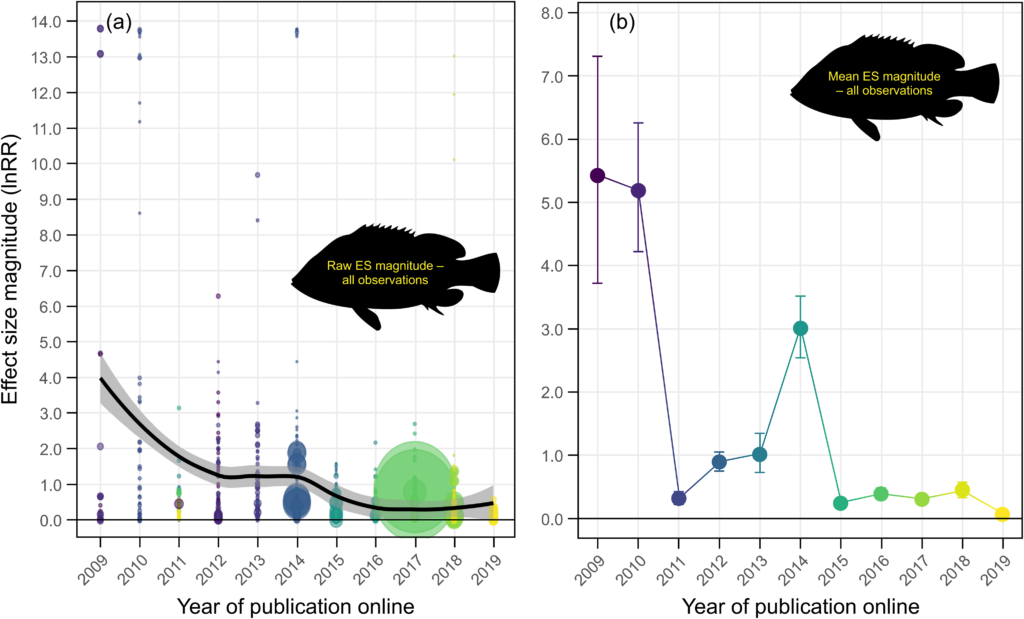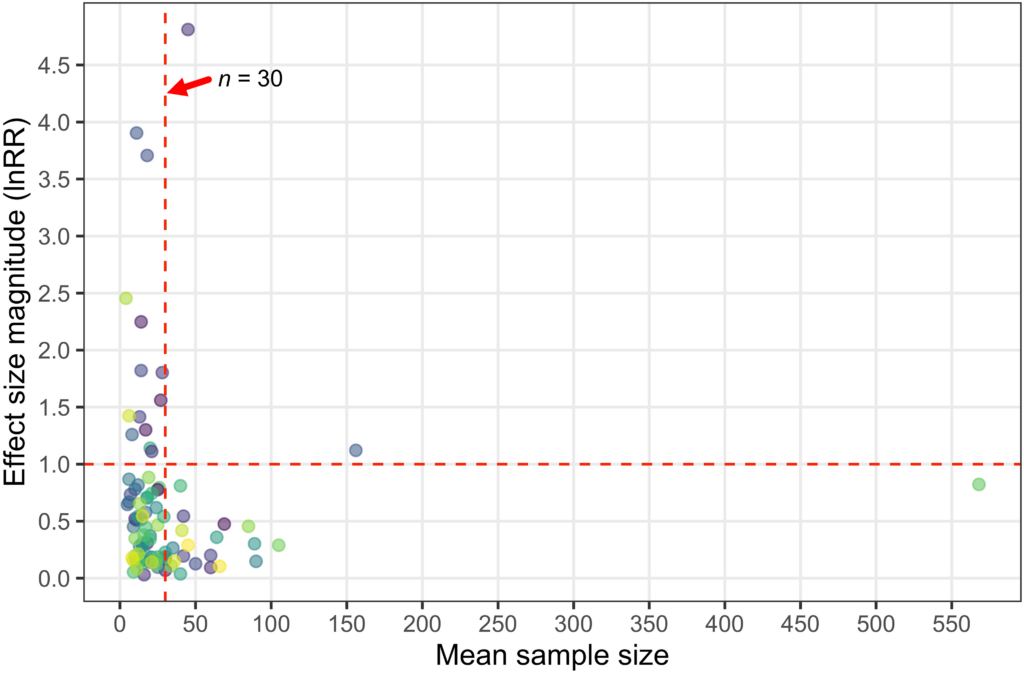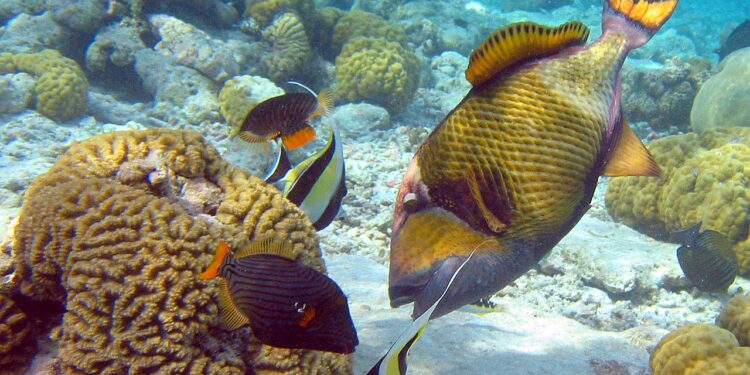Ocean acidification refers to the decrease in the pH of the world’s oceans owing to the absorption of carbon dioxide from the atmosphere. One of its alleged effects is marked changes in the behaviour of fish that inhabit coral reefs.
For example, one 2010 study published in Proceedings of the National Academy of Sciences found that exposing larval fish to elevated CO2 disrupted their olfactory systems, leading them to become attracted to the smell of their predators. As a result, they experienced a 5–9 fold increase in mortality from predation.
Such studies have generated substantial media coverage, including headlines such as ‘Increasingly acidic oceans are causing fish to behave badly’ and ‘Losing Nemo – acid oceans prevent baby clownfish from finding home’. And they’ve even been presented at the White House.
Yet according to a recent meta-analysis, effect sizes in this literature have declined dramatically over time – suggesting that early studies (like the one mentioned above) overstated the impact of ocean acidification on fish behaviour.
Jeff Clements and colleagues reviewed 91 studies published between 2009 and 2019, and obtained an ‘effect size’ from each one. Here, the effect size was a measure of the difference in fish behaviour between the control group, and the treatment group that had been exposed to lower pH.
The authors main results are shown in the chart below. The left-hand panel shows all the effect sizes (91 in total), while the right-hand panel shows the average value for each year.

As you can see, studies published in 2009 and 2010 reported much higher effect sizes than those published in subsequent years – especially the last five years. Indeed, averages for the last five years are close to zero.
One plausible explanation for this ‘decline effect’ is the presence of methodological biases in early studies, which were then corrected by later, more rigorous studies. In particular, studies with small sample sizes are more prone to false positives, and are easier to ‘p-hack’.
p-hacking is where researchers do things like exclude data, change outcome variables or run different tests until they detect a significant ‘p-value’. The p-value is a way of quantifying one’s confidence that a scientific result is real, and not due to chance.
Consistent with this explanation, Clements and colleagues found that all the studies from 2009 and 2010, which had reported very large effect sizes, were based on small samples – in almost every case, less than 30 fish.

By contrast, most of the studies with sample sizes of at least 50 fish were clustered near the bottom of the effect size scale. One study with a very large sample size yielded a moderate effect size.
As the authors note, the decline effect has been observed in various research areas. It most likely stems from the fact that novel studies yielding too-high effect sizes are more likely to prompt replication attempts than those yielding null effect sizes. Hence most new research areas begin with large effect sizes.
However, there’s another explanation for the decline effect observed in Clements and colleagues’ meta-analysis: research misconduct. A university investigation recently found that Danielle Dixson (the researcher who presented her findings at the White House) has committed both fabrication and falsification in her work on fish behaviour.
Dixson was a prolific researcher, which means that many – perhaps all – of the large effect sizes from earlier years may have simply been made up. Indeed, when Clements and colleagues excluded studies published by her or her colleagues from their meta-analysis, the decline effect was no longer apparent.
As to why it took so long for Dixson’s misconduct to be uncovered, one might speculate that other scientists concerned about climate change wanted to believe her findings. In any case, the effects of ocean acidification on fish behaviour are much smaller than previously claimed, and may in fact be close to zero.












To join in with the discussion please make a donation to The Daily Sceptic.
Profanity and abuse will be removed and may lead to a permanent ban.
It seems Dixson took her PhD at JCU, home of another data controversy – Oona Lonnstedt and her lion fish (https://www.science.org/content/article/can-you-spot-duplicates-critics-say-these-photos-lionfish-point-fraud). There does seem to be a possible systemic problem, or at least cause for concern.
Are there any other examples of this sort of thing?
Defund JCU?
Yes… everything to do with the climate change scam.
I am making $50 an hour working from home. I never imagined that it was honest to goodness yet my closest companion is earning $11,000 a month by working on a laptop, that was truly astounding for me, she prescribed for me to attempt it simply. Everybody must try this job now by
just using this website… http://www.Profit97.com
What has this got to do with the thread?
Never mind the acidification of fish! All I know is that the acidification of chips does wonders to improve their flavour. The liberal sprinkling of a dilute solution of CH3COOH in combination with NaCl crystals works wonders following the imbibing of 6-8 pints of a dilute solution of C2H5OH on a Friday night.
Now that’s what I call research!
Whatever is happening, if anything, only 4% of the CO2 is allegedly attributable to human activity, so 96% of any effect is down to nature
“methodological biases” means dishonesty, I think.
… fraud, a better word.
Isn’t increasing acidification the same as decreasing alkalinity?
At the moment the pH (measure of acidity or alkalinity) of the ocean is 8.1, and is alkaline. A neutral solution is pH7.0. An acid solution is one with a pH lower than 7.
The further the pH is from 7 the more aggressive a chemical reaction becomes, so moving the pH towards neutral is making the solution less aggressive.
Yet another example of alarming language designed to get an emotional response from the masses.
I have not yet encountered anyone calling an increase in sea pH, which does happen, alkalinification.
But then alkaline- that’s not scary is it?
And…… isn’t decreasing the pH in an alkaline solution properly called neutralisation, since it moves the pH towards 7 thus neutrality.
But then, neutral – that’s not scary either.
It did when I went to school, but that was back in the 1960s when we still had education not social engineering and indoctrination in the sins of Man and his destruction of Mother Earth.
Exactly, but I am probably not qualified to comment as I only did physics to degree level (in the 60s too), not social science.
This climate change milarky is such fun to behold.
When the oceans warm, as they do with global warming, there is outgassing of CO2, meaning their pH increases. But under ‘climate change rules’, the reverse happens, warm oceans absorb more CO2 and pH decreases.
Emissions from fossil fuels is supposedly wholly responsible for increasing the atmospheric concentration of CO2, but under ‘climate change rules’, this CO2 is leaving the atmosphere to be absorbed in the oceans in order to bother the fish – without decreasing atmospheric concentration.
The global temperature record is not detecting an increase in global temperatures but rather reporting a slight decrease after more than a decade of no change.
But under ‘climate change rules’ global warming is increasing but the heat is not heating the near surface, it is bypassing the thermometers and hiding in the deep oceans, without passing through the upper layers and warming them first before descending to the deep.
So we have warming oceans outgassing CO2 whilst absorbing it, an atmosphere gaining CO2 whilst losing it into the oceans, increased heating which is making us cooler, and special climate change heat which is able to defy the Second Law of Thermodynamics.
It’s The Science™️ …science Jim, but not as we know it.
Now that’s what I call ‘The Science. ‘
Succinctly put.
Could you do a graph, please showing the correlation between government grants and prophecies of doom? How many multi-billion dollar handouts are offered to organisations that says everything is OK?